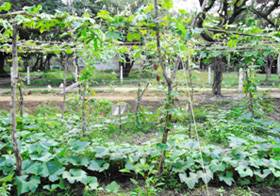|
 Situated about 20 minutes away from the main road in Welikanda, the Senapura centre is home to 74 former cadres who fought with the LTTE at various stages. Ranging from 18 to 35 years in age, they are mainly from
Batticaloa, Vavuniya, Mullaitivu, Kilinochchi and Jaffna, and the programme they are following spans one year or more. Funded by the Ministry of Justice, the primary function of the Senapura centre is to provide these young people with the skills needed to integrate in society and
secure employment. Daily activities are completed to a schedule. Following the hoisting of the national flag and singing of the national anthem, religious observances are made. There is already a kovil and a church in the vicinity, and the ex-combatants are in the process of
building a temple as well. This is followed by physical training. The rest of the dayís programme, which is a mixture of learning, fun and games, gets underway afterwards. Situated about 20 minutes away from the main road in Welikanda, the Senapura centre is home to 74 former cadres who fought with the LTTE at various stages. Ranging from 18 to 35 years in age, they are mainly from
Batticaloa, Vavuniya, Mullaitivu, Kilinochchi and Jaffna, and the programme they are following spans one year or more. Funded by the Ministry of Justice, the primary function of the Senapura centre is to provide these young people with the skills needed to integrate in society and
secure employment. Daily activities are completed to a schedule. Following the hoisting of the national flag and singing of the national anthem, religious observances are made. There is already a kovil and a church in the vicinity, and the ex-combatants are in the process of
building a temple as well. This is followed by physical training. The rest of the dayís programme, which is a mixture of learning, fun and games, gets underway afterwards.
'We are being treated well here. This is a good opportunity for us to improve our skills and get some kind of an education before we go back to join society. I hope to start a new life by returning to my family and continuing their fishing business,' said one of the men who has
been at the centre for several months.
The young people are taught four courses per year. Carpentry, masonry, electrical work and farming are taught for three months. In the near future, there are plans to introduce a driving course as well, which is said to be very much in demand. Mathematics, Sinhala, English, Tamil,
Social Studies and General Knowledge are taught on a long term basis, while another subject of their choice in Aesthetics is taught in the short term. They may choose between music, dancing, singing and painting. In recognition of the importance of a sound knowledge of computing,
the centre has already started training in this field. Officials are even looking at the possibility of teaching foreign languages to those keen on securing jobs overseas, for some of the young people who have graduated from the programme have already gone abroad.
School teachers from the area and from the Polonnaruwa Technical College come to teach these courses. Each individual is evaluated monthly and personal reports are made.
Facilities are also provided for informal education. The young people have access to books, television, cassette players and newspapers. To encourage interpersonal skills, the centre provides facilities for the ex-combatants to play games such as carom, chess, football, volleyball
and cricket. Apart from games, they are also encouraged to participate in agricultural work, and neatly planted fruit trees and vegetables are to be found all around the site. The official in charge pointed out that it is the youth themselves who maintain and look after these
plants, while their daily meals often consist of fruit and vegetables from the garden .
In order to develop leadership skills, leaders are appointed for each task to be undertaken. For example, there is a leader for the library, watching television, the mess and so on. At the end of each day, all the young people meet in order to discuss and reflect on what they have
learnt.
Supervisors conduct daily interviews to assess the progress of each individual. After monitoring them continuously, they are given their National Identity Cards and other relevant documents if necessary and helped to return home.
Visits by loved ones are permitted every month. To facilitate this, arrangements have been made to allow the visitors to stay overnight if they have travelled a long distance. The ex-combatants are also taken on monthly trips to places such as Kandy, where they recently had the
opportunity of visiting the Peradeniya Botanical Gardens.
The official in charge of the centre says that another 100 to 200 newcomers could be accommodated if they were given basic facilities. For example, they donít yet have beds or mattresses. There are other shortcomings too. The training programmes need to be reviewed to ensure that
they are relevant to the jobs that are in demand, and there is also a need to equip the staff with better knowledge in areas such as counselling.
Nevertheless, the Senapura centre is up and running. The young people who once knew only the gun and bullet are seeing a different world. Having taken the first steps towards their new lives through the knowledge and skills learnt at the centre; they aspire to become good citizens
of Sri Lanka, to contribute in their own way to the development of society.
These are not the only ex-LTTE combatants to have turned over a new leaf. In the Eastern Province, many young people who once fought for the LTTE have returned to their homes and found work. Meanwhile, the Government has already started training for the ex-combatants who have been
coming down from the North in recent days, even while they stay with their families in the welfare villages.
Policy Unit
Secretariat for Coordinating the Peace Process
|